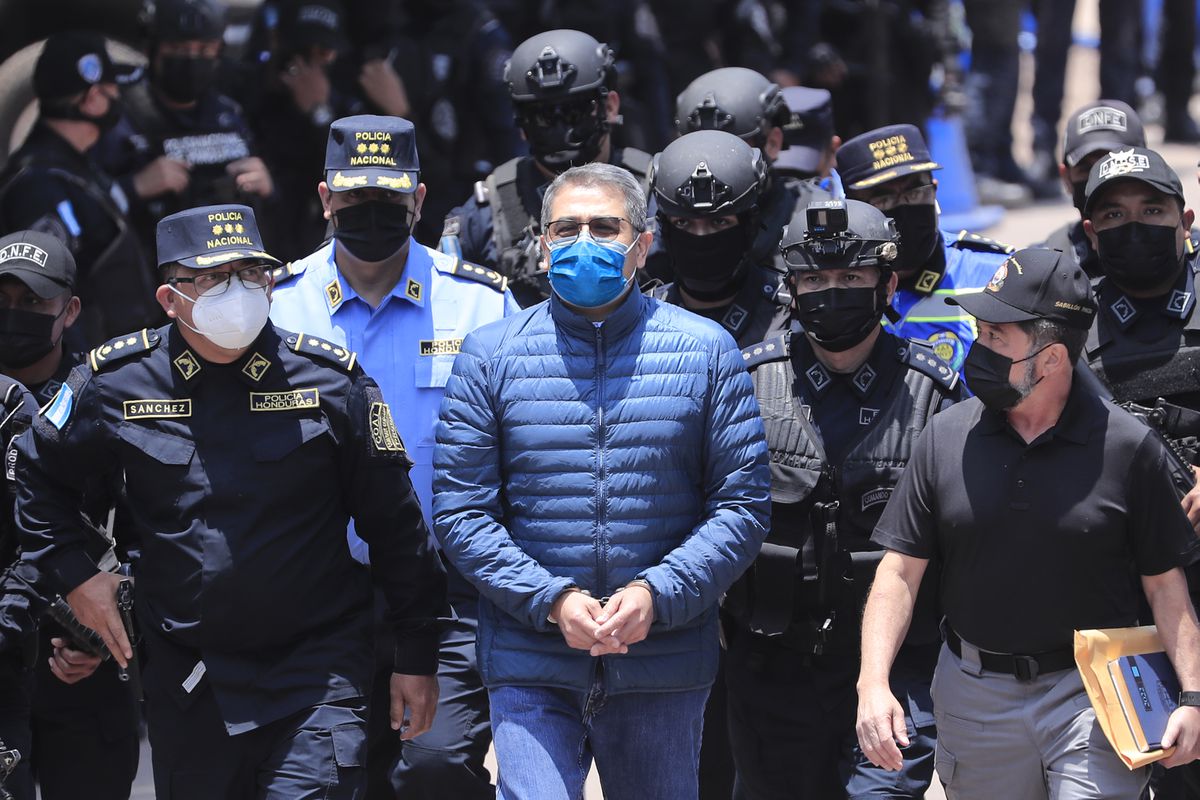
The former Honduran president, Juan Orlando Hernández, has been extradited this Thursday to the United States. The former president will face trial for drug trafficking, after a New York court accused him of participating in a “conspiracy” to facilitate the entry of tons of cocaine into US territory and of receiving millions of dollars from criminal organizations in his country. and Mexico. Among them is the bloodthirsty Sinaloa Cartel, led by Joaquín ‘El Chapo’ Guzmán, who is serving a life sentence in a maximum security prison in Colorado.
The accusation has been prepared by the Court of the Southern District of New York and establishes that Hernández used the profits generated by his ties to drug trafficking “to enrich himself, finance his political campaigns and commit electoral fraud, including in connection with the presidential elections in Honduras of 2013 and 2017″. Authorities state in the document that in exchange for the illicit funds, the former president “protected drug traffickers, including his brother and former member of the Honduran National Congress, Juan Antonio Hernandez Alvarado, alias “Tony Hernandez.” Tony Hernández was sentenced to life in prison plus another thirty years in prison in March 2021, after being found guilty of four charges presented by the United States Department of Justice, related to drug trafficking, including the shipment of tons of cocaine to United States territory. .
The US judicial authorities affirm that the former president used his position and influence “to operate the country as a narco-state, in order to enrich himself and corruptly gain and maintain power.” They also point out that he had “corrupted the legitimate institutions of Honduras, including parts of the National Police, the military and the National Congress.” For US justice, Hernández presented himself as an ally of Washington in the fight against organized crime, “while contributing with his accomplices to Honduras becoming one of the largest transshipment points in the world for cocaine destined for USA”.
Hernández has repeatedly defended himself against these accusations. In a public letter released on social networks on March 28, the former president claimed to be innocent and that his extradition process is a “revenge of the cartels” for what he considers his strategy to confront them while he was in prison. can. This Thursday, after being sent to the United States, his wife, Ana García Hernández, published a video on Twitter in which Hernández alleges that he has been subjected to a judicial process “unfairly.” The former president affirms in the video that “I worked tirelessly with the purpose of recovering peace in Honduras. We gave our maximum effort for our nation and it is unfortunate that those who turned Honduras into one of the most violent countries on the face of the earth now want to be heroes.”
The 53-year-old former president was transferred in handcuffs this Thursday afternoon in a helicopter to a military base from a special unit of the National Police, where he had been in preventive arrest since February 15, when he was captured at his home in Tegucigalpa. . The Honduran Supreme Court ruled at the end of March in favor of extraditing the former president to the United States, whom Washington was demanding to prosecute him for links to organized crime. The United States had also withdrawn his US visa and included him on the list of “corrupt and undemocratic actors.” “The United States is promoting transparency and accountability in Central America by making public the visa restrictions against former Honduran President Juan Orlando Hernández due to corrupt acts. Nobody is above the law”, said the head of US diplomacy, Antony Blinken, a few months ago. Blinken led the way by saying that Hernández had been significantly involved “by committing or facilitating acts of corruption and drug trafficking, and by using the proceeds of illicit activities for political campaigns.”
In his last interview before leaving power, the one granted to EL PAÍS on December 22, Juan Orlando Hernández defended himself by saying that he was a victim of drug traffickers whom he had fought for years. Hernández insisted that he paid the price for having dared to approve the extradition of capos and that the United States drug enforcement agency, the DEA, had secret recordings that confirmed his belligerence against the large drug cartels. Less than two months after that response, the United States is knocking on his door.
Join EL PAÍS to follow all the news and read without limits.
subscribe
Subscribe here to newsletter of EL PAÍS America and receive all the informative keys of the current affairs of the region





